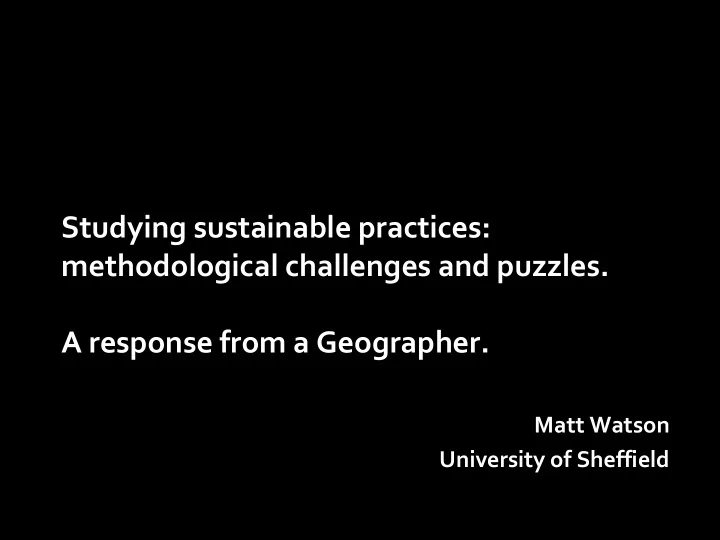

Studying sustainable practices: methodological challenges and puzzles. A response from a Geographer. Matt Watson University of Sheffield
Practice – entity and performance Not just ‘what people do’: • Practice as a coordinated entity ‘a temporally unfolding and spatially dispersed nexus of doings and sayings’ (Schatzki 1996) • Practice as a performance Processes of doing through which practice-as-entity is sustained, reproduced and potentially changed
Practices are the fundamental unit of social existence ‘ both social order and individuality…result from practices ’ (Schatzki 1996)
Traces, proxies and surveys: research on social practice does not necessarily imply the use of intensive, qualitative or anthropological methods. But if we are to generate data in more extensive, and quantitative forms, what ‘proxies’ of practices can be meaningfully accessed and analysed. What ‘traces’ do they leave behind or produce, how can these be identified and utilised?
Traces, proxies and surveys: research on social practice does not necessarily imply the use of intensive, qualitative or anthropological methods. .. yes it does (if we want to understand practice in relation to sustainability)
There is no such thing as a sustainable practice 1. A practice is not given as an object of inquiry – it has to be constituted: and the validity of the analytical construct can only be meaningfully tested through detailed research
There is no such thing as a sustainable practice 1. A practice is not given as an object of inquiry 2. A practice-as-entity has no direct impact – impacts result from the performances through which it is reproduced
There is no such thing as a sustainable practice 1. A practice is not given as an object of inquiry 2. A practice-as-entity has no direct impact – impacts result from the performances through which it is reproduced 3. Sustainability of a practice is therefore relational and situational – has to be established: a) Relative to the practices which it directly competes out for reproduction/performance b) Through its consequences for the overall organisation of the practitioner’s day – with what practices does it intersect, bundle, co- exist, compete…
Cycling as an example…
Cycling fuel has environmental impacts - so sustainability of cycling depends on what it replaces. Taking direct CO2 impacts: Good if it replaces car driving (and/or visits to the gym or pool) Bad if it replaces, say, watching TV Details of performance matter Bundling and knock-in consequences for other practice performances – eg, cycling makes you smelly Intersections of practices
What are the consequences of performances? Typically, cycling takes 80kJ/km (McKay 2009) Intersecting practice 1: Eating Typical embodied energy of bicycle fuel 539kJ/km (Coley 2002) Depends upon details of practice – Bananas 40g CO 2e /km Cheeseburgers 160g CO 2e /km (Berners-Lee 2010)
What are the consequences of performances? Typically, cycling takes 80kJ/km (McKay 2009) Intersecting practice 1: Eating Intersecting practice 2: Disposing Estimated typical embodied energy of bicycle = c. 190 kJ/km (Lovelace et al 2011)
There is no such thing as a sustainable practice 1. A practice is not given as an object of inquiry 2. A practice-as-entity has no direct impact – impacts result from the performances through which it is reproduced 3. Sustainability of a practice is therefore relational and situational – has to be established: a) Relative to the practices which it directly competes out for reproduction/performance b) Through its consequences for the overall organisation of the practitioner’s day – with what practices does it intersect, bundle, co- exist, compete…
Trajectories of change • Demands understanding of systemic embeddedness of practices and their dynamics • Implies some longitudinal perspective – ongoing research and/or historical approach • Changes in elements – eg meanings, technologies • Dynamics of recruitment and defection • Shifting inter-relations between practices
Trajectories of change • Understanding systemic relations between details of doing requires multi-method approaches, following relations • Profound limits to prediction; informed speculation • Understanding dynamism requires....
Moving between levels • ‘levels’ are analytical framings based on prioritisation of characteristics of spatial and temporal reach of processes and flows • However ‘macro’, always constituted and reproduced by performances o practices in specific places and time • In principle, all ‘levels’ are equally open to same methods of research, though questions (and issues of access, etc) may be different
Recommend
More recommend